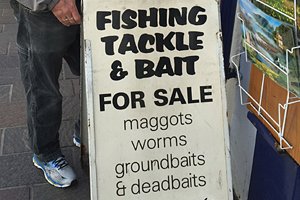
Tim Lesmeister prepares to purchases some bait before wetting a line in Great Britain.
I just returned from jolly old England. The elections just ended after what seemed to most Brits like a long bit of campaigning: about six weeks. Some people at the pubs were cussing about the results, some were smiling and saying, “I told you so,” and some were discussing important matters, like fishing.
Sitting in the Farmers Arms pub in Muker, I connected with a member of the local fishing club. We discussed what type of fishing was available in the region, how much it cost, and whether a pilgrim like myself could wet a line. In England you either have to be a member of a club to fish designated waters, or you have to pay to play on ponds and streams someone else owns. I am very familiar with the fishing situation in the United Kingdom because I lived south of London in 1998.
The waters I fished near Surrey back then were mainly ponds and small stretches of river. One of my favorite pieces of water was on the River Dun in Hungerford in Berkshire. This was mostly for rough fish or “coarse” fish as say in England. The coarse fish family consists of carp, roach, tench, perch, and others.
A friend was a member of the Salisbury Angling club, so I could fish some nice stretches of river in the shadow of Stonehenge. These were trout rivers that club rules regulated so heavily that catching anything was tough.
Rules for fishing trout near Salisbury specified lures and the presentation. You had to use barbless dry flies on floating line, and the fly could drift below you on the stream. So if the trout were not hitting surface lures, you were out of luck. The lure was in the air a lot because I was constantly pulling it out and casting it up into the current of the stream. I’d cheat on these streams and goober up my fly with Berkley trout scent, which really got the fish’s attention though I’m pretty sure I was breaking a rule. Anything that could give an angler a little bit of a break was against the rules.
You pay to play in England. Say you visit to a pond in Surrey that allowed day anglers. Some don’t. On some you need to be a member to fish. On a body of water that accepts day passes you might pay 20 pounds to get a peg and five pounds per rod. A “peg” is a small stretch of the pond where you have to fish. You can’t just wander along the shoreline.
On the River Dun in Hungerford, you visit the pub in town and pay for your ticket and rods, then fish anywhere on the 100-yard stretch from the dam to the turn.
On my last trip to England I was lucky enough to connect with a club member who loaned me some gear and told me where to fish. My friends in England look completely astonished when I describe our public access to lakes and rivers. We take our resource access in this country for granted. Going aborad provides a good reminder of how fortunate I am to live in a country where water rights are public. Across the pond, if you wish to play the fishing game, expect to shell out a few bucks, quid, euros, or whatever the local currency.


 Edited
Edited